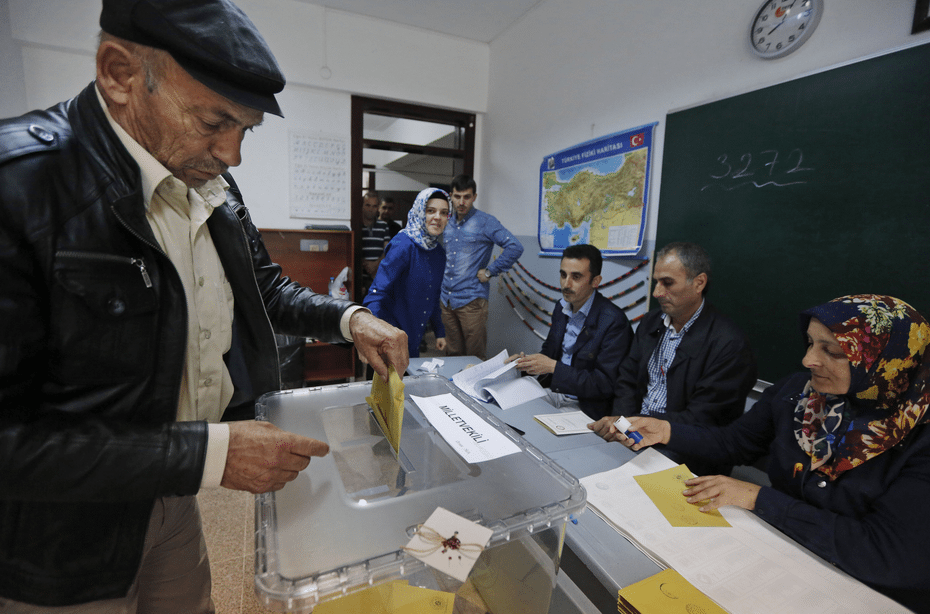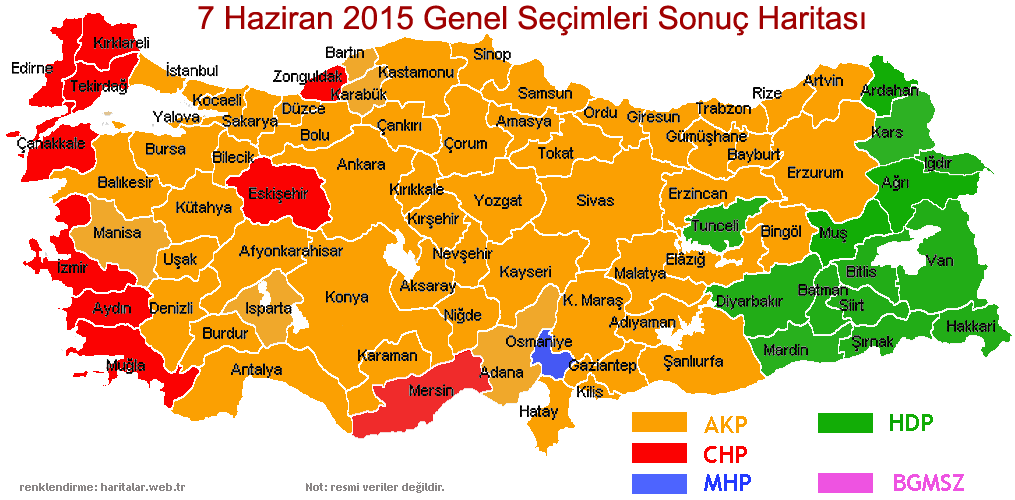On June 7, Turkish citizens went to the polls to elect 550 members of the Turkish Parliament. What did the election mean for the Armenians of Turkey, of Armenia, and of the diaspora?
First, a few facts and context for the reader: More than 85 percent of the eligible 55 million voters—some 45 million people—voted. Turkey’s President Recep Tayyip Erdogan, who is supposed to be impartial and above party politics by law, relentlessly campaigned every day on behalf of his former party, the Justice and Development Party (AKP), leaving the current prime minister and leader of the party, Ahmet Davutoglu, mostly out of the limelight. The two opposition parties, the Kemalist/nationalist Republican Party (CHP) and the ultra-nationalist/racist National Movement Party (MHP), tried to attack the governing AKP, but were mostly ineffective. The rising star in the election was the newly formed pro-Kurdish party, the People’s Democratic Party (HDP), which ran an extremely effective campaign, organizing not only in Kurdish-populated regions but fielding candidates all over Turkey on a platform of equality, peace, and democracy for all ethnic minorities and the underprivileged. The HDP faced the additional obstacle of needing to go over the barrier of 10 percent of the total votes, failing which they would lose the right to be represented in parliament.

Despite the enormous success of the AKP and Erdogan in the previous 10 elections—for the considerable economic progress made and the increase in the standards of living and prosperity, the accomplishments in eliminating the interference of the army in politics, and the success of starting a peace process with the Kurdish guerilla movement and ending the daily killing of Turkish soldiers and Kurdish resistance fighters—this election had become a referendum on whether to allow Erdogan to become a dictator or not.
Erdogan wanted to increase the powers of the presidential office to be able to govern without much interference and accountability to the elected politicians. He would be able to do that if the AKP elected 330 or more members of parliament. And Erdogan attacked the weak opposition of the CHP and MHP with utmost contempt for their incompetence, meanwhile ignoring the swelling hatred against him and his cronies after the discovery of major corruption and bribery scandals, the opulence of a 1,100 room presidential palace that he built for himself, and the revelation of truckloads of arms secretly transferred by Turkish intelligence to ISIS and other forces fighting against the Syrian regime.
The main obstacle against Erdogan’s wish to become a Putin-like president with absolute powers seemed to be the unknown quantity of HDP voters. If the HDP exceeded the 10 percent barrier, it would elect at least 60 MPs, but if the HDP failed to exceed the 10 percent barrier, all votes cast for the party would be lost—and transferred to elect 60 or more MPs for the AKP. Therefore, President Erdogan, Prime Minister Davutoglu, and other AKP leaders attacked the HDP more than the CHP and MHP.
One of the strategies used to discredit HDP was employing the tried and true tactic of hatred against Armenians. It was claimed that the HDP’s leaders had made agreements with Diasporan Armenian leaders, promising land and compensation to Armenians. It was claimed that more than 100 HDP candidates were “hidden Armenians.” It was claimed that if the HDP came to power, they would kick out all Kurds from eastern and southeastern Turkey and cede those regions to Armenia. Kurds were warned against voting for the HDP, if they wanted to keep their lands. They were ordered to stay away from HDP election campaigns, which were organized by Armenians.
During the election campaigns, 7 HDP sympathizers were murdered, more than 500 HDP sympathizers were beaten, burned, and injured, and more than 150 HDP party offices and campaign vehicles were attacked, burned, or bombed.
The results of the election? The AKP elected 256 MPs with 40.86 percent of votes; the CHP elected 132 with 24.95 percent; the MHP elected 80 with 16.29 percent; and the new HDP elected 80 MPs with 13.12 percent of the votes, easily exceeding the 10 percent barrier.
The election results indicate that the AKP could not form a government on its own. Apart from this conclusion, there are now many uncertain scenarios emerging, as to what sort of coalition government can happen, and which parties will go to bed with each other.
The AKP can form a government with either the CHP, MHP, or HDP. Failing that—and to the horror of the AKP—the CHP, MHP, and HDP can join together and form a government. If that doesn’t work either, then there will be early elections. At present, it is too early to tell what sort of policy toward Armenians within and outside Turkey will be adopted, as it will depend on the new coalition partners’ composition.

These elections were unprecedented from several aspects. Three Armenian MPs were elected, one each from the HDP, CHP, and AKP. The Armenians of Turkey are now over-represented, with 0.5 percent in the parliament, versus a population proportion of only 0.07 percent. But as Garo Paylan, the newly elected HDP MP, stated, “Rather than the number of Armenians in the parliament, it is more important what each of them will say in the parliament.” The other emerging fact to ponder is the emergence of the HDP as the winner in 16 border provinces. As can be seen in the map, with HDP elected in all of the eastern and most of the southeastern provinces, the Turkish people have now lost contact and borders with Georgia, Armenia, Iran, Iraq, and half of Syria.
The story will continue to unfold.


“The Turkish people have now lost contact and borders with Georgia, Armenia, Iran, Iraq, and half of Syria.”
What? Did HDP win their independence? Are the Turkish people banned from these 16 border provinces that are in Turkey?
It is perfectly obvious what the author meant. What is your point?